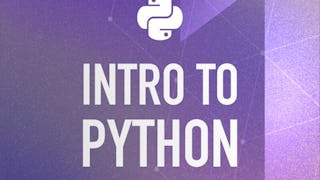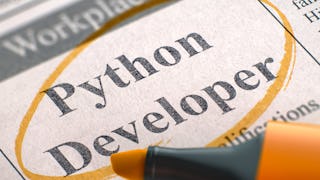This course introduces the basics of Python 3, including conditional execution and iteration as control structures, and strings and lists as data structures. You'll program an on-screen Turtle to draw pretty pictures. You'll also learn to draw reference diagrams as a way to reason about program executions, which will help to build up your debugging skills. The course has no prerequisites. It will cover Chapters 1-9 of the textbook "Fundamentals of Python Programming," which is the accompanying text (optional and free) for this course.

Cultivate your career with expert-led programs, job-ready certificates, and 10,000 ways to grow. All for $25/month, billed annually. Save now


Python Basics
This course is part of Python 3 Programming Specialization


Instructors: Paul Resnick
480,397 already enrolled
Included with 
(17,995 reviews)
What you'll learn
Learn Python 3 basics, including conditional statements, loops, and data structures like strings and lists.
Develop practical programming skills by creating drawings and building your debugging abilities.
Skills you'll gain
Details to know

Add to your LinkedIn profile
3 assignments
See how employees at top companies are mastering in-demand skills

Build your subject-matter expertise
- Learn new concepts from industry experts
- Gain a foundational understanding of a subject or tool
- Develop job-relevant skills with hands-on projects
- Earn a shareable career certificate


Earn a career certificate
Add this credential to your LinkedIn profile, resume, or CV
Share it on social media and in your performance review

There are 4 modules in this course
In week one you will be introduced to programming in python through lectures and the Runestone textbook - an interactive online textbook built for this course. By the end of the module, you will have run your first python program, and learned how to draw images by writing a program.
What's included
30 videos2 readings1 assignment36 app items
In week two you will use the lectures and the Runestone textbook to understand the basics of a few python data types - lists, strings, tuples - as well as a control structure - for loops. By the end of this week, you will be able to write more complex programs that create drawings by incorporating for loops. Finally, we will present the basics of an accumulation pattern to you, which will be expanded on in each week for the rest of the course.
What's included
22 videos1 assignment24 app items
In week three you will learn a new python data type - the boolean - as well as another control structure - conditional execution. Through the use of video lectures and the Runestone textbook, you will learn what Binary, Unary, Nested, and Chained Conditionals are, as well as how to incorporate conditionals within an accumulation pattern.
What's included
13 videos1 assignment17 app items
In week four we will present deeper knowledge on using lists, strings, and python objects in general. We will also cover how to use the accumulation pattern with lists and with strings. The final assignment will test your knowledge and skills through application, much like previous assessments and assignments did, though with a more difficult set of tasks now that you have learned the basics.
What's included
23 videos2 readings21 app items
Instructors

Offered by
Recommended if you're interested in Software Development


Scrimba


Scrimba


Rice University


Microsoft
Prepare for a degree
Why people choose Coursera for their career




Learner reviews
17,995 reviews
- 5 stars
83.95%
- 4 stars
13.78%
- 3 stars
1.38%
- 2 stars
0.35%
- 1 star
0.52%
Showing 3 of 17995
Reviewed on May 27, 2020
The course teaching how to think as a programmer, not just the syntax of one language. The dedication and motivation of the teaching staff comes through in the delivery and content of the course!
Reviewed on May 30, 2020
This course is very good for beginners. The content and flow of the course is amazing. online practice tool to run our codes online without installing any software makes is even more user friendly.
Reviewed on May 1, 2023
Great course and easy to follow. The only suggestion I have is to do lesson 2 the best you can then move on because some of the practice questions have answers from lessons that come after this one.
New to Software Development? Start here.

Open new doors with Coursera Plus
Unlimited access to 10,000+ world-class courses, hands-on projects, and job-ready certificate programs - all included in your subscription
Advance your career with an online degree
Earn a degree from world-class universities - 100% online
Join over 3,400 global companies that choose Coursera for Business
Upskill your employees to excel in the digital economy
Frequently asked questions
Access to lectures and assignments depends on your type of enrollment. If you take a course in audit mode, you will be able to see most course materials for free. To access graded assignments and to earn a Certificate, you will need to purchase the Certificate experience, during or after your audit. If you don't see the audit option:
The course may not offer an audit option. You can try a Free Trial instead, or apply for Financial Aid.
The course may offer 'Full Course, No Certificate' instead. This option lets you see all course materials, submit required assessments, and get a final grade. This also means that you will not be able to purchase a Certificate experience.
When you enroll in the course, you get access to all of the courses in the Specialization, and you earn a certificate when you complete the work. Your electronic Certificate will be added to your Accomplishments page - from there, you can print your Certificate or add it to your LinkedIn profile. If you only want to read and view the course content, you can audit the course for free.
If you subscribed, you get a 7-day free trial during which you can cancel at no penalty. After that, we don’t give refunds, but you can cancel your subscription at any time. See our full refund policy.
More questions
Financial aid available,


